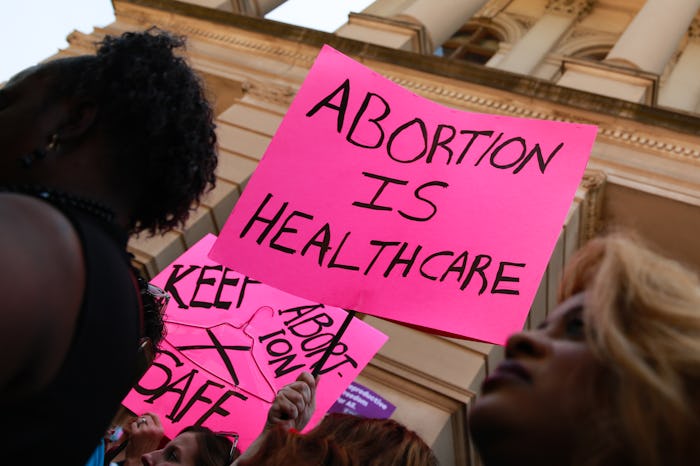News

Study: Denying Abortion Care May Result In Long-Lasting Health Problems
Reproductive health rights are undergoing major changes across the nation and depending on where they live, access to abortion serves are becoming harder to obtain. Pro-life proponents would say that this is a good thing, but the truth is, denying abortion care may result in long-lasting health problems, according to a new study.
New research published in the Annals of Internal Medicine found that women who were denied abortions were more likely to report chronic diseases, persistent pain and poor overall health for at least five years post denial. And as Lauren Ralph, co-author of the study, told TIME, research has shown that "having an abortion is much safer than childbirth" for some women, but not much research has been done on the subject "over the long-term." But this new study, as Ralph explained to TIME, "demonstrates that having an abortion is not detrimental to women’s health, but being denied access to a wanted one likely is."
To reach their findings, researchers collected information from 30 abortion facilities in the United States from 2008 to 2010. According to the study, a total of 874 women were included in the study: 328 who had first-trimester abortion, 383 who had second-trimester abortion, and 163 who gave birth.
During a five-year period, according to The Los Angeles Times, researchers interviewed the participants to keep track of their overall health by recording aliments like chronic abdominal, pelvic, back, and joint pain; chronic headaches or migraines; obesity; asthma; gestational and non-gestational hypertension and diabetes.
While the differences in health between women who had a abortion and those who didn't was small, the favorable results leaned towards those who had one, according to the study. This meant that women who were denied an abortion were slightly worse off both emotionally and physically, the research found.
For instance, those women who were denied an abortion were 29 percent more likely to report migraine headaches than those who had an abortion, according to The Los Angeles Times. Women who gave birth rather than having a wanted abortion were also 45 percent more likely to report chronic joint pain, the study found.
Abortion access or not, having a baby is a health risk in itself. According to the U.S. Center for Disease Control and Prevention, about 700 American women die from childbirth and pregnancy related complications each year.
"I think our study findings offer much needed evidence about what might happen if we continue to restrict women’s access to a wanted abortion," Ralph explained to Salon. "Although some argue that abortion is detrimental to women’s health, these data do not suggest worse health over five years in women who received an abortion compared to those who were denied one and went on to give birth."
To date, nine states have passed bills that would enact early abortion bans, according to NPR, and others are expected to follow suit. Most restrict abortions after the sixth or eighth week of pregnancy. Currently, Alabama has the harshest ruling, effectively banning abortion unless the mother's life is in danger, according to The New York Times. But there is a silver lining as states like Nevada and Illinois work to make reproductive rights a priority, and protect access to abortion services, according to CNN.
There are thousands of factors that contribute a woman's decision to seek an abortion. And whether or not she has access to one could greatly affect the trajectory of the rest of her life. Reproductive health rights remains a huge issue in today's political landscape, as it should be. Keeping an eye on what's going on will be critical in electing officials that will serve as allies for protecting basic health care.